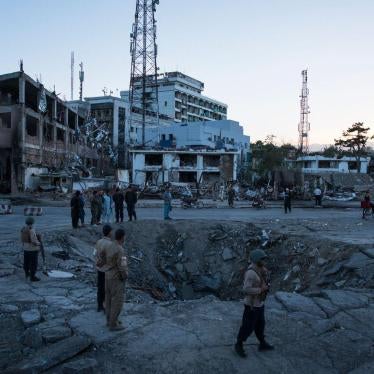Human Rights Watch today called on the Indonesian army to disband, once and for all, militias operating in West Timor. If it fails to do so, donor countries should reinstitute the ban on commerical military sales to Indonesia imposed in September 1999 at the height of the army-led violence in East Timor.
Militias, including men who could face charges of crimes against humanity for their role in murder, rape, arson, and forced displacement during the anti-independence campaign last year, have escalated operations in East Timor over the last month. Squad-sized units have crossed the border from West Timor, killing two peacekeepers and terrorizing the civilian population. Concern is mounting that more deaths may take place as the anniversary approaches of the August 30, 1999 referendum that led to East Timor's separation from Indonesia.
"These raids are taking place under the nose of elite Indonesian troops," said Mike Jendrzejczyk, Washington director of Human Rights Watch's Asia division. "The militias are well-armed, well-organized, well-trained, and they've got apparently inexhaustible supplies of ammunition. If the army is not stopping them, that's because it's chosen not to do so."
Jendrzejczyk said despite different theories about who was masterminding the militia activity -- Indonesian army headquarters in Jakarta, regional commanders, or a group of disaffected or disgraced officers linked to former President Soeharto – it was clear that Maj. Gen. Kiki Syahnakri, head of the Bali-based command that includes West Timor, could do far more than he was doing.
At a minimum, he said, Syahnakri could be using his authority to systematically search known militia camps and residences for weapons and obtain evidence to detain militia members on suspicion of illegal possession of firearms while further investigations proceed.
Some sources have suggested that Syahnakri is unwilling to act for fear of causing riots in the militia-controlled camps in West Timor, where pro-integration feelings run high, or for fear that his troops might have to fire on militia members who themselves were the creation of the army.
"The Indonesian army is doing just what it did in East Timor from January to September 1999," said Jendrzejczyk – "standing by and doing nothing while serious abuses take place."
He said that donors should insist that the militia be put out of business prior to the next World Bank-convened donor conference on Indonesia, scheduled to take place in October in Tokyo, Japan.
Since mid-July, dozens, perhaps hundreds of militia members operating from bases in West Timor have crossed into East Timor in groups of ten to fifteen men. A New Zealand soldier was shot and killed on July 24, a Nepalese soldier on August 11. Most of the incursions have been into the East Timorese border districts of Covalima and Bobonaro, but militia members have reached the interior provinces of Ermera and Ainaro as well.
As a result of last year's violence, the U.S., Australia, and the European Union imposed a ban on commercial military sales to Indonesia. The E.U. lifted the ban in January 2000, allowing each member country to decide itself whether or not to resume sales. The United Kingdom, for example, has resumed delivery of Hawk aircraft. Last year, the U.S. Congress adopted legislation prohibiting direct sales of military equipment to Indonesia, but commercial sales were not covered by the law. The Clinton administration stopped such sales in September 1999, but the administration is now consulting Congress about selling some spare parts and equipment.






